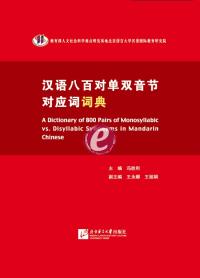Online Reading (Non-downloadable): A Dictionary of 800 Pairs of Monosyllabic vs. Disyllabic Synonyms in Mandarin Chinese
Price:
Author Feng Shengli
ISBN 9787900849595
Pub Date 2025-05
Page Count:801
Target Audience(Age) 中级,高级,准高级
Annotation Language
Medium eBooks
- Overview
- About the Author
This study systematically examines disyllabic-monosyllabic word pairs in Mandarin Chinese, revealing rich and consistent contrasts across register, semantics, syntax, and morphological function. These contrasts are demonstrated through minimal pairs and grammaticality judgments, offering a principled account of how syllable count governs Chinese grammar. Specifically, the monosyllabic-disyllabic opposition serves to anchor register, mark syntactic structures, distinguish meanings, and establish morphological paradigms.
1.Register-Syntax Interface
Monosyllabic words (e.g., 买 mǎi "buy," 读 dú "read") belong to colloquial register, while their disyllabic counterparts (e.g., 购买 gòumǎi "purchase," 阅读 yuèdú "read formally") are formal. Syntactically, monosyllables resist coordinate predicates (我买和读了一本书 Wǒ mǎi hé dú le yī běn shū ?), whereas disyllables permit them (我购买和阅读了一本书 Wǒ gòumǎi hé yuèdú le yī běn shū* ?).
2.Semantic Granularity
Disyllables often exhibit semantic bleaching. For instance, 挖 wā "dig" requires four semantic components: [using tools/hands], [inward motion], [applied force], and [removal], whereas 挖掘 wājué "excavate" relaxes the tool requirement, enabling abstract collocations (挖掘潜力 wājué qiánlì "tap potential" ? vs. 挖潜力 wā qiánlì ?; 挖掘思想 wājué sīxiǎng "explore ideas" ? vs. 挖思想 wā sīxiǎng ?).
3.Morphological Constraints
Syllable count governs nominalization: disyllabic verbs permit de-marked nominal forms (教材的编写 jiàocái de biānxiě "textbook compilation" ?), while monosyllables prohibit them (教材的编 jiàocái de biān ?). Similar contrasts include 家具的摆放 jiājù de bǎifàng "furniture arrangement" ? vs. 家具的摆 jiājù de bǎi ?.
These findings provide critical data for Chinese register studies, lexicology, syntax, morphology, word formation, and prosody. The accompanying Dictionary of Chinese Register-Sensitive Word Pairs will serve as an indispensable resource for advancing research across these disciplines.
